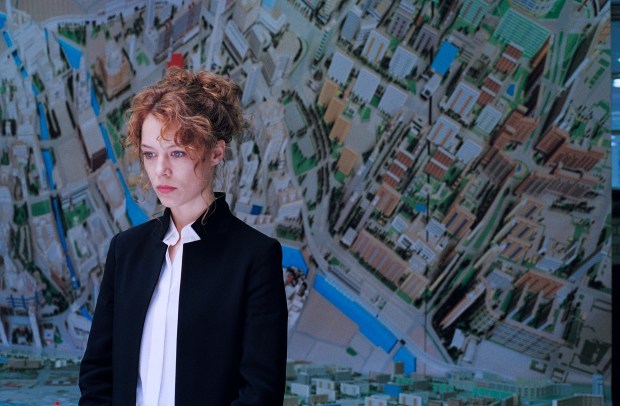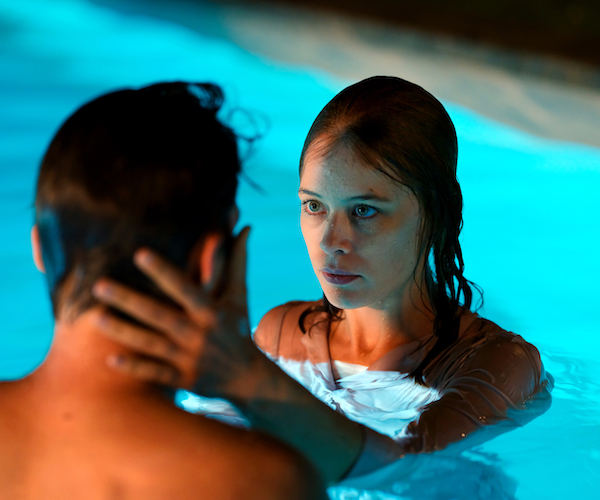Film Review: “Undine” — Subtle Mythology, Intense Emotion
By Peg Aloi
Undine is a film best savored (and best absorbed) with a second viewing. Viewers must be open to its charms, perhaps allowing memories of the primal to seep into their consciousness.
Undine, directed by Christian Petzold. Screening at Kendall Square Cinema.

Paula Beer as Undine in Christian Petzold’s Undine. Photo: IFC Films.
Christian Petzold has crafted yet another intricate film that brims with ideas and symbolism, but at times unfolds as a quirky but dark romance. In his last film, Transit, the filmmaker mined the horrors of Germany’s past history of human trafficking and nationalism to create a modern fable of alienation complicated by the desire for human connection. That film too has romantic synergy at the heart of its story, an exploration of the notion that we can be haunted, even consumed, by people whose lives we share only briefly.
Like Transit, Undine is also set in Berlin and also stars Paula Beer and Franz Rogowski., as Undine and Christoph. In the film’s opening scene, Undine is talking with her lover Johannes at an outdoor café. They seem to be breaking up. She is about to go to work, but asks him to meet her again on her break in thirty minutes. Undine says quite earnestly that if he doesn’t meet her, she will have to kill him. He dismisses her words as nonsense. There is already another woman in the picture, and Johannes seems resigned to leaving Undine.
Undine enters the museum where she works as a historian and tour guide. After she hurriedly changes into her uniform, she proceeds to give her usual talk to a group of visitors. After one presentation, she runs into Christoph, who is inside the same café where she met Johannes. He complements her work and awkwardly proceeds to ask her to stay and have coffee. She refuses, but then, in an almost slapstick meet-cute moment, Christoph backs into an aquarium in the museum. The fish tank shatters all over the floor. The two of them are knocked to the floor, uninjured but dazed, lying close together amid the plants, fish, and water. An almost mystical attraction is established — after that they become inseparable.
Christoph works as a commercial diver, a dangerous job that fascinates Undine, who enjoys swimming and has an intense connection to the water. Her museum job is focused on architecture and the role it plays in a changing Berlin, making her points via scale models of the city before and after the East-West separation. The film spends a fair amount of time on these talks, almost to a fault. Clearly this history serves as a metaphor, perhaps a vision of world history that complements the mythic, ancient power of Undine’s true nature. It’s also clear that her manner of delivery to visitors is unique: she’s soft voiced and gentle, compared to the other employees, who are somewhat louder and more assertive. Undine’s life revolves around her job and whatever man is in her thrall: there are no friends or hobbies or social life, despite her living in one of the most sophisticated cities in Europe. But then, this is not your typical urban love story.

Franz Rogowski as Christoph and Paula Beer in Undine. Photo: IFC Films.
An undine is a water creature that can take on human form, similar to a mermaid or siren or selkie. These famously beautiful creatures enchant and seduce men. Other films have explored the tales inspired by this figure: notably, John Sayles’ The Secret of Roan Inish (1994), Neil Jordan’s Ondine (2009), and the recent Polish horror musical The Lure (2015). And, of course, there’s lighter fare such as Ron Howard’s Splash (1984) and Mr. Peabody and the Mermaid (1948). Petzold’s film does not overtly engage with or even mention the folklore behind the story.And that is boldly effective — less is more and this film’s appeal lies in its quiet air of mystery.
Despite the story’s mythic undertones and its pervasive romantic longing, Undine concentrates on an almost animalistic quality that permeates its characters’ behavior. Actions seem inevitable and fatalistic. As Undine, Paula Beers is calculating but inscrutable. We have to guess at her motivations, though they principally seem to emanate from instinct. She is guided by the unknowable desires in the heart of her kind. Christoph is hapless and so he quickly becomes profoundly driven. The undine myth is a powerful iteration of what romantic obsession feels like: it is dreamy and not quite real, yet bodies of the love struck are commandeered in ways they barely understand. The film has quite horrific moments, but overall it leaves an impression of subtlety and thoughtfulness. Its contemporary production design makes room for a sense of the fantastical to peek through. Some viewers may find the film slow moving or occasionally confusing. Undine is a film best savored (and best absorbed) with a second viewing. Viewers must be open to its charms, perhaps allowing memories of the primal to seep into their consciousness, letting themselves be reminded of our deep connection with nature and how it informs our modern existence
Peg Aloi is a former film critic for the Boston Phoenix and member of the Boston Society of Film Critics. She taught film studies in Boston for over a decade. She writes on film, TV, and culture for web publications like Vice, Polygon, Bustle, Mic, Orlando Weekly, Crooked Marquee, and Bloody Disgusting. Her blog “The Witching Hour” can be found at themediawitch.com.
